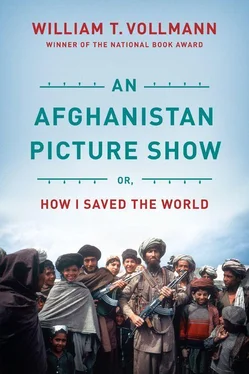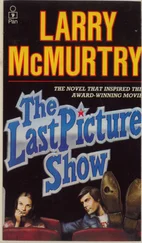At Kohat the houses were sometimes grass-roofed castles whose ramparts were molded of mud and gravel. These had baked hard in the sun; they were very hot to the touch. Blankets and bedding lay stretched out on them to dry.
At the little soft-drink stands, fruit stands, cigarette stands, sat vendors indistinguishable from those about Peshawar. It was hot in the camps, though, and often there was no ice for the Fantas and orange sodas. — As for the Young Man, he sat in town, drinking his ten Sprites a day.
In the camps people were polite to him. They never asked him for anything.
HELPLESSNESS [4]: STATEMENT OF DR. TARIQ (Hangu Camp, Kohat — I.R.C.)
Levi’s van pulled up by a dispensary tent. It was only about nine in the morning, so it was not too hot yet; and they were up in the hills anyhow. Then tents and mud houses of the camp were widely spaced, but they went on and on. You could walk up the ridge and across the rolling plateau and up the next ridge and along the hill and up the ridge again and still see no end to it.
The dispensary was crowded. A baby cried. Women in chadors — red or green or black — waited silently. They drew back when the Young Man was brought in. Dr. Tariq had stopped his examinations for the moment in Levi’s and the Young Man’s honor, and his assistant brought them both cups of green chi . The baby cried and cried.
“How many people a day do you treat?” said the Young Man, switching on his tape recorder. The Afghans watched in fascination.
“Per day is about three hundred, four hundred patients,” said Dr. Tariq.
“What’s your greatest need here?”
“Well, we would like funds for the X-rays, because most of the people are having tuberculosis. We would like to screen the patient’s immediate family. I mean, like about ten chaps are living in one tent, so when the mother’s got it, I think frankly the children must be having it also. They’re very crowded. ‡And another immediate requirement, I should say, is caused by the fact that these people are from a cold climate. They’re not used to the Pakistani climate. It’s very hot here. And especially for the ladies with this thick garment of theirs.” —He pointed to a patient in a chador. — “You see this clothes that she’s wearing? It’s very thick, and they wear it day and night. We’ve been having cases of bleeding from the nose.”
“Too much heat can do that?”
“Yeah,” Dr. Tariq said. “And patients are coming in with a fever of 106°, 107°. We try to cold-sponge them and whatnot, but it takes time. We are hoping that they can have mud houses. In this heat it is too much for them to live in a tent, especially as these tents are nylon, some of them, so the heat is really wicked.”
“Are people suffering from malnutrition?”
Dr. Tariq was surprised. “Oh yeah. About five minutes back I saw a very severely anemic lady, and if there was some hospital I would have taken her …”
STATEMENT OF THE INTERNATIONAL COMMITTEE OF THE RED CROSS HOSPITAL ADMINISTRATOR
“We are mainly involved in the surgical field in Peshawar,” the man explained. “We have a hospital of one-hundred-bed capacity, and we treat mostly, uh, victims of war inside Afghanistan. Most of the wounds we have are bullet injury, mines injury and let’s say also broken legs from normal accident inside Afghanistan.”
It was refreshing to hear his crisp Swiss-French accent. He was very clean, and in fact the hospital was much cleaner than anyone had a right to expect.
A man lay shiny-eyed in the bed, watching the clear liquid drip down from the plastic bag into the first white joint of the plastic tube, then down to the second, not far above his face, then down onto his arm with its white dressings, and his hands were outflung and open, and his chest was etched like a map of islands black upon a sea of tender pinkness. The Roos had dropped napalm on him.
“How are the patients referred to you?”
“Well, most of them are coming to our hospital by themselves. I mean they have very often to walk about two, three days from inside Afghanistan to the border, and then they take taxi or private car to the hospital here. The weakest ones die on the road due to the length of the trip. It’s more difficult to treat something that is already old, and this is infected sometimes, and they don’t have the right thing to treat inside , right on the spot where the accident happened.”
(“Accident” was a quaint term, the Young Man reflected as he came to the man who had taken a bullet in the jaw, so that a bandage went around his head like a bonnet and a plastic thing pulled his lower lip down so that slobber ran down it from his bloody tongue and his mustache was wet with sweat and blood and a tube went up his nose and his red-rimmed eyes stared very wide and still and patient.)
“There is a lot of infections, and a lot of amputations,” the man went on, “and we have an artificial-limb workshop for these people after they have been treated, and we help them to walk again after this. And we have a facility for the paraplegics …”
The detail that the Young Man most remembered later was a lovely, intricately carved wooden plate. Having nothing else to do, the patients who were still capable of using their hands produced these artifacts. They sold them for next to nothing.
HELPLESSNESS [5]
In his undergraduate years, the Young Man had been very impressed with the way that Wittgenstein would demolish beautiful ontological edifices with taps of a chisel, each tap a vicious, laconic, numbered proposition (“298. The very fact that we should so much like to say: ‘This is the important thing’—while we point privately to the sensation — is enough to shew how much we are inclined to say something which gives no information”). As he went about trying to Help the Afghans in the Best Possible Way, his mind composed — effortlessly — a similar set of entries in its ledger of self-torture. At first they were vacuously abstract, like a nightmare brought on by some vague bodily discomfort. As the Young Man’s health continued to decline, however, they took on an anecdotal character. The Young Man accepted them, as he did his many free Sprites, with passive courtesy. He knew that they could do him no harm, since he never abandoned a project that he had begun, even if something convinced him that it was wrong. Besides, they tended to contradict each other:
(1) Being a citizen of the U.S.A., I really don’t understand what anyone is doing in Afghanistan. This failure of imagination, while not directly relevant, nonetheless vitiates my activities.
(2) Even if the Afghans get their country back, in the long run it will be invaded again. Whether or not this is a ludicrous argument depends on how long the long run is. It does not make sense to give up brushing my teeth on the grounds that someday they will fall out anyway, but it may be intelligent not to rebuild a house of cards in a strong prevailing wind. I suppose that if Afghanistan were left to itself during the rest of my lifetime I would be satisfied. But that would hardly encourage me to live a long time.
(3) Since I have decided to be “of service,” people might well ask me whom I will be of service to, and under what circumstances. — “If I saw a woman being starved by her relatives I would help her.” This absurdity can be demolished fairly easily. Afghan women and girls tend to be malnourished. They eat last. Sometimes, a doctor in the camps told me, their families just let them die. If the only evil that had been brought to my attention vis-à-vis Afghanistan were the suffering of women within the family, I’d never have lifted a finger, because I am neither Afghan nor a woman, and so right away I would KNOW that there was nothing that I could do. It might well be that in changing the position of a woman in an Afghan family I would destroy the Afghan family. (Maybe, for that matter, it is better to be an Afghan woman than an American woman. I might prefer to eat last and to be protected from men’s eyes by my thick black veil while I sat in my hot tent than, wearing my fashionable skirt, to eat all I want in some restaurant while enduring comments about my tits. Who am I to say? — How simple, by comparison, is the wrongness of a napalm wound!) — Most likely, if I were an Afghan woman I would have no idea of what it would be like not to be an Afghan woman. As it is, I have no idea how to help any or all Afghan women be Afghan women. Should I marry four refugees, as the Holy Qur’an allows, and try to make them all happy?
Читать дальше












